Part of our company’s 30th Anniversary Year Series — only featured posts are visible on the blog. (You can start by reading Part 1 here.)
Today is Blog Action Day 2011, coinciding with World Food Day, which prompted me to write this post about my own personal journey with food. I think that blogs and all social media can play a vital role in starting conversations about how to make changes in our individual lives and the world. In 2010, the theme for Blog Action Day was Water and water-related issues; in 2009, it was Climate Change. I have participated in all three of the past years’ events, and I look forward to sharing some of my experiences with food, and hearing what you have to say about yours, whether you comment under my post, or on your own blog—or we can have conversations about food on social networks. For instance, you can follow @BlogActionDay and the hashtag #BAD11 on Twitter.
When I first moved to San Francisco in the mid-1970s, I became a vegetarian for about three years. I had grown up in the Midwest, in a heavily meat-eating family, although we often ate fresh, organically grown vegetables and fruit because both sets of my grandparents had retired to country homes, and my Hrudicka grandparents started a small farm. My mother canned the fresh vegetables and made homemade jams and preserves, so even in the winter months, we were very fortunate to be able to eat well. My Grandma Hrudicka made homemade wines and beer in her cellar, and she fed fresh meat to the packs of stray dogs that roamed on to her land. Her own dogs were the best fed animals I have seen anywhere I’ve traveled in the world.
In my early days in San Francisco, I lived with several sets of roommates who were good cooks, and who taught me about shopping at the local farmers’ markets, in Chinatown, and at what was then called the “Food Conspiracy,” which has since evolved to food co-ops. I learned how to steam vegetables and stir-fry using a Chinese wok, and I learned how to order vast quantities of grains, miso, tahini, exotic teas and other food that came in large vats or jars, through the Food Conspiracy. Every month, you would meet at the household of one of your fellow Food Conspirators and order the food, and that household would process the order forms. Later in the month, you would meet in the garage or basement of another Food Conspirator’s home and pick up your household’s food in boxes or lots of bags. It often meant borrowing a car or bringing all your roommates so that you could each carry some of the food home.
During this period, I also learned about making fresh juices with no sugar or fructose corn syrup added, and using sea salt or no salt, and instead, flavoring my food with the variety of fresh spices we bought via the Food Conspiracy. Later, I would grow some of my own herbs in my backyard garden, and for a while, I hosted a friend’s budding sprout business in mason jars in my own kitchen because he didn’t have enough room in his apartment.
I was a vegetarian because a number of my roommates were, but also because I never liked the idea of eating animals. Always an animal lover, it bothered me to hear about the horrible factory farming conditions and slaughterhouses that animals endured, and since I enjoyed seeing peaceful looking cows, goats, sheep, and other “meat” animals grazing on rural hillsides in Northern California, it made me sad to think about their fate. I loved cheeses, ice cream and milk in my coffee, so I continued to eat dairy products, but whenever possible, I tried to buy organically produced products. After I learned about the delightful places I could visit in Northern California, such as Sonoma, Napa and Mendocino Counties, I made more frequent trips. I loved seeing the spring lambs with their mothers, or the families of young piglets and their parents along the highway; and when I returned later in the year, and all the lambs and piglets were gone, I was filled with a deep sorrow, realizing where they had gone.
Even in my childhood, I was often luckier than other members of my family when we went fishing, catching some of the largest and tastiest of the fish—but I often had mixed feelings about my success when I saw each fish dying, struggling to catch its last breath, caught on the end of my sharp and obviously painful hook. Some of the adults would tease me and tell me I was “too sensitive.” Now that I’m older, I think of that as a good quality, otherwise known as compassion. Many studies have shown that if children learn compassion toward animals, they tend to become more compassionate to other humans as well.
Unfortunately, after about three years as a vegetarian, I became very ill and developed an unusual second case of severe mononucleosis, which lasted for more than a year (my first case of mono was in college). The doctors who examined me were surprised and told me that was very unusual. Completely puzzled, I told them I ate a very good diet of fresh vegetables and fruit, grains, fresh juices, salads, eggs and cheese. They ran a bunch of lab tests and told me my amino acids were unbalanced, I was anemic and was not getting enough protein or iron. They asked me if I was cooking beans, which at the time, I didn’t particularly like because they upset my stomach. So, I said no, and they told me that if I were going to continue being a vegetarian, I had to learn even more about how to correctly balance my food intake so that I would be getting all the nutrients I needed. Back then, if you were a vegan or vegetarian, you pretty much had to prepare most of your meals from scratch; now, there have been many improvements in the packaging of vegan and vegetarian foods, so it’s possible to have a busy life and buy more pre-packaged meals of quality, and of course there are many good cookbooks that will tell you how to prepare quick vegan or vegetarian meals.
So, reluctantly, at the urging of the doctors, I slowly started eating small amounts of meat again, mostly fish, seafood and chicken, with the occasional holiday turkey dinner (although some of my friends have prepared absolutely scrumptious vegan or vegetarian holiday dinners for years that are so delicious, I never missed the turkey). When I thought about it more, I realized a major difference between my vegetarian years in the mid-70s and my mononucleosis episode a few years later, was that my life had speeded up to a serious degree and had become much more stressful. I had found a career direction, plus I was performing in music groups, teaching music, and writing articles. I was almost always busy, so my food preparation time had diminished, and I was not being as careful about balancing my diet. I was “eating on the run” way too often. Instead of stopping at fast food burger places, I would stop in juice bars and grab a glass of carrot or fruit juice and a salad, thinking that was enough to stay healthy. It wasn’t—my health history meant that I needed to take more time to plan and prepare my meals.
It took me a long time to recover from both incidents of mono, and during the second episode, I simply wasn’t recovering, after several months—I was always exhausted, and I was getting worse. After initially taking medicine for the tonsillitis and strep throat that had accompanied the mono onset, there were no other drugs the doctors could give me. Fortunately, I had a friend then who had dropped out of western medical school and studied Chinese medicine. He suggested I try a diet that included miso 2-3 times a day, and azuki beans, which were rich in iron. He said my vegetarian diet had become “too yang” and I needed “more yin.” He told me to consume fewer salads and juices, and eat mostly dark, leafy green vegetables and sea weed, often added to miso-based soup. He also showed me how to make miso salad dressing, and even add miso to Cream of Wheat for breakfast. So, for months, I ate miso soup 2-3 times a day, miso-infused breakfasts, and an occasional bowl of azuki beans. Amazingly, I began to get better.
Flashing forward to now, I still eat fresh vegetables and fruit, and have even enjoyed growing my own tomatoes, green beans, zucchini, eggplant and other garden specialties. My husband and I eat a low or no-salt diet, and we are very careful to examine the ingredients on all jars of soups, sauces and juices bought in stores, also trying to eliminate corn syrup and excess sugar from our diets. Shortly after we first met, he had initially lured me to his house with the temptation of a rosemary roast chicken, which he had lovingly cooked, and I accepted, although I told him I was trying to return to a more vegetarian-based diet. He loves to cook, and I am his favorite guinea pig, so I now take a bit of a “when in Rome” approach and will try a chicken, turkey or fish dish he has prepared—but I told him I would not eat veal because of the cruel veal crate conditions the calves are raised in, and I would not eat lamb, rabbits, beef, pork or processed meats. I did make an exception for organically produced chicken apple sausages, although I am also appalled at the way factory farm chickens are treated, so I’ve made a point of finding organic poultry producers in our area.
When left to my own devices, I still cook mostly vegetable and tofu dishes, or fish and seafood, and I still eat miso soups and salad dressings with miso, tahini or fruit and vegetable bases. I am now much more careful to eat grains balanced with some beans or another balanced protein source. I would like to think that now that I’m better informed, and buying “on the go” vegetarian and vegan meals has become easier, I could return to a completely vegetarian or vegan diet. I’m thinking about it again, and I know I’ll have to be very careful, due to some of my health issues. I do still love to eat dark chocolate, cheeses and ice cream, but more often, I eat low-fat dairy products and have often substituted soy, rice and other grain milks for dairy products.
So, I still feel that I’m on a food journey, and will perhaps always be on a food journey. I love to eat well and know a number of chefs at fine restaurants and other establishments. I’ve tried to convince a few of them to cook less meat and not use veal. In the San Francisco Bay Area, and particularly in Berkeley, we are fortunate to have high quality restaurants that make a point of using organically raised animals, which is better than factory farmed animals morally, but it’s still meat.
I try not to be heavy-handed or “preachy” when I talk with friends about eating meat, but in my own life, I’m on a path to eating less and less of it, so that I can once again enjoy watching the spring lambs graze on hillsides (and I am pleased to report that more people I know are now raising lambs only for their wool, which they are selling to local yarn shops). I feel it is a spiritual path for me, although not tied to any one particular religion. One day soon, I hope the entire world will move one person or family at a time toward freeing the veal calves from their crates, other animals from the cruelties of factory farming and slaughterhouses, and that those agribusinesses will be joining small farmers in growing fields of fresh, organic vegetables and fruits instead. Studies have shown we could more efficiently and economically feed the entire world if this vision is achieved. Meanwhile, I am taking one step at a time to change the world by changing myself, reducing one type of meat—or saving one animal—at a time, and educating myself about how to eat less, exercise more, and stay healthy.
So now, let’s break bread together. It’s your turn. What do you think about, when you talk about food? What’s important to you?
Please feel free to leave a comment here about your relationship to food, for World Food Day and Blog Action Day 2011…and have some dessert!
(All food photos by Cathryn Hrudicka)
This post is part of our company’s 30th Anniversary Year series. A previous announcement about Blog Action Day 2011 and the theme of Food was posted on Posterous.
Return to the Cathryn Hrudicka & Associates Home Page

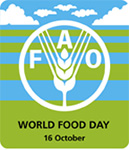
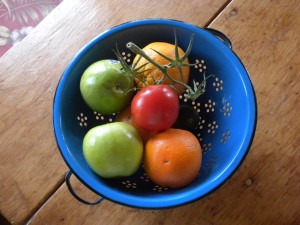
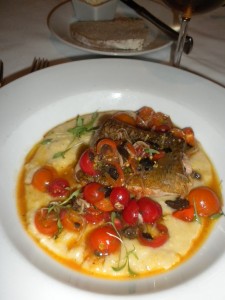
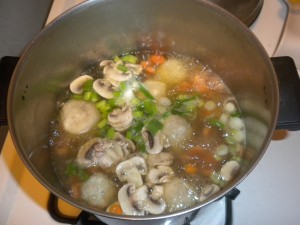
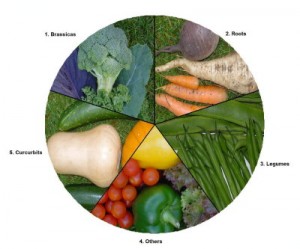
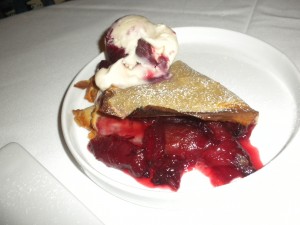
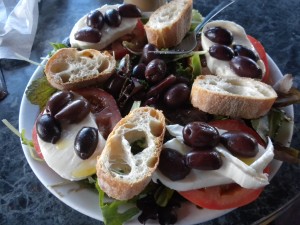
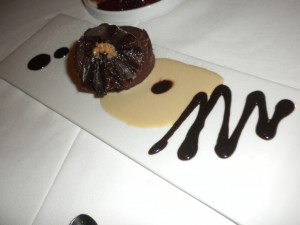



















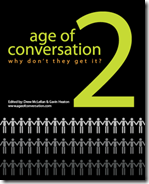
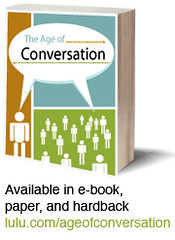



2 Comments
Cathryn, I’m inspired by the way you were able to stick more to a vegan diet and steer clear of meats. In the last 10 years, I moved away from eating too many red meats and eat more fish and poultry to get the benefit of nutrients needed for a balanced diet. I’ve cut down on the amount of food I eat, and stay away from sugars and desserts. I feel so much more vitality. Diet makes a big difference. Thanks for sharing your journey in relation to foods throughout your life.
Hi Robyn,
Thanks for stopping by and commenting. Diet does make a big difference, and I’m glad I’ve learned more over the years about planning my nutrition in a healthier way. I’m doing well at not eating too much salt, but I still love certain desserts—so I’m trying to reduce the sugar and dairy in them and eat smaller portions. I’m glad you’re enjoying eating less meat. I’ve found that once you adjust to it, you really don’t miss it as much as you think you will. In fact, now, red meats would just feel heavy to me and harder to digest. Stay well—it’s good to hear from you.